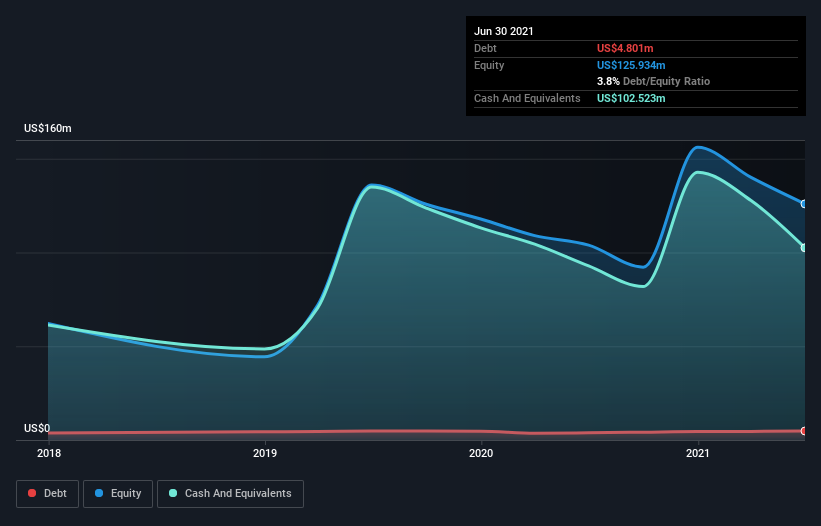Health Check: How Prudently Does HOOKIPA Pharma (NASDAQ:HOOK) Use Debt?
Some say volatility, rather than debt, is the best way to think about risk as an investor, but Warren Buffett famously said that 'Volatility is far from synonymous with risk.' It's only natural to consider a company's balance sheet when you examine how risky it is, since debt is often involved when a business collapses. We note that HOOKIPA Pharma Inc. (NASDAQ:HOOK) does have debt on its balance sheet. But the real question is whether this debt is making the company risky.
When Is Debt Dangerous?
Debt assists a business until the business has trouble paying it off, either with new capital or with free cash flow. In the worst case scenario, a company can go bankrupt if it cannot pay its creditors. While that is not too common, we often do see indebted companies permanently diluting shareholders because lenders force them to raise capital at a distressed price. Of course, plenty of companies use debt to fund growth, without any negative consequences. When we examine debt levels, we first consider both cash and debt levels, together.
See our latest analysis for HOOKIPA Pharma
What Is HOOKIPA Pharma's Net Debt?
The image below, which you can click on for greater detail, shows that at June 2021 HOOKIPA Pharma had debt of US$4.80m, up from US$3.82m in one year. However, it does have US$102.5m in cash offsetting this, leading to net cash of US$97.7m.
A Look At HOOKIPA Pharma's Liabilities
Zooming in on the latest balance sheet data, we can see that HOOKIPA Pharma had liabilities of US$33.9m due within 12 months and liabilities of US$6.35m due beyond that. On the other hand, it had cash of US$102.5m and US$20.9m worth of receivables due within a year. So it can boast US$83.2m more liquid assets than total liabilities.
This surplus strongly suggests that HOOKIPA Pharma has a rock-solid balance sheet (and the debt is of no concern whatsoever). Having regard to this fact, we think its balance sheet is as strong as an ox. Simply put, the fact that HOOKIPA Pharma has more cash than debt is arguably a good indication that it can manage its debt safely. There's no doubt that we learn most about debt from the balance sheet. But ultimately the future profitability of the business will decide if HOOKIPA Pharma can strengthen its balance sheet over time. So if you want to see what the professionals think, you might find this free report on analyst profit forecasts to be interesting.
Over 12 months, HOOKIPA Pharma reported revenue of US$20m, which is a gain of 24%, although it did not report any earnings before interest and tax. Shareholders probably have their fingers crossed that it can grow its way to profits.
So How Risky Is HOOKIPA Pharma?
Statistically speaking companies that lose money are riskier than those that make money. And we do note that HOOKIPA Pharma had an earnings before interest and tax (EBIT) loss, over the last year. Indeed, in that time it burnt through US$63m of cash and made a loss of US$60m. But the saving grace is the US$97.7m on the balance sheet. That means it could keep spending at its current rate for more than two years. With very solid revenue growth in the last year, HOOKIPA Pharma may be on a path to profitability. Pre-profit companies are often risky, but they can also offer great rewards. The balance sheet is clearly the area to focus on when you are analysing debt. However, not all investment risk resides within the balance sheet - far from it. For instance, we've identified 3 warning signs for HOOKIPA Pharma that you should be aware of.
Of course, if you're the type of investor who prefers buying stocks without the burden of debt, then don't hesitate to discover our exclusive list of net cash growth stocks, today.
This article by Simply Wall St is general in nature. We provide commentary based on historical data and analyst forecasts only using an unbiased methodology and our articles are not intended to be financial advice. It does not constitute a recommendation to buy or sell any stock, and does not take account of your objectives, or your financial situation. We aim to bring you long-term focused analysis driven by fundamental data. Note that our analysis may not factor in the latest price-sensitive company announcements or qualitative material. Simply Wall St has no position in any stocks mentioned.
Have feedback on this article? Concerned about the content? Get in touch with us directly. Alternatively, email editorial-team (at) simplywallst.com.

